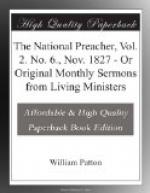But still more particular and urgent are his instructions—The disciples, when sent forth, were admonished that they would be “as sheep in the midst of wolves;”—that they would be exposed to many and severe trials. And surely, under such circumstances, human nature would plead, that, when persecuted in the city, they might turn to the less prejudiced inhabitants of the country. But no: the command is, “When they persecute you in one city, flee ye into another; for, verily, I say unto you, ye shall not have gone over the cities of Israel, till the Son of Man be come.”
It is true, that in the last great commission, in which the world was spread before them as the field, every limitation was taken off, save that they should begin at Jerusalem. Still the example of the apostles is worthy of notice. For whilst several of them continued for years in Jerusalem,—notwithstanding the persecutions which they experienced—others went forth, and immediately preached the gospel of their ascended Saviour in other great cities of the world.
Paul and Barnabas are found at Antioch, the capital of Pisidia. From Antioch they went to Iconium, the metropolis of Lyconia. Thence to Derbe, another city of Lyconia. In that embassy, they also preached at Lystra, and Perga, and many other cities. Soon after this, Paul said unto Barnabas, “Let us go again, and visit our brethren in every city where we have preached the word of the Lord, and see how they do.” Paul expressed an ardent desire to be at Jerusalem on the feast-days:—“For he hasted, if it were possible for him, to be at Jerusalem, the day of Pentecost;” for then thousands of strangers would be there assembled—“Parthians, Medes, and Elamites, and the dwellers of Mesopotamia,” and of many other places. In Rome, too, that imperial city, did this apostle continue for two years, preaching the gospel of Christ. There he established a Christian church, to which he addressed the noblest epistle ever written. Of Philip it is recorded, that “passing through, he preached in all the cities, till he came to Cesarea.” The apostles and disciples, then directed their attention very particularly to cities.
III. Cities were the theatres of the Holy Spirit’s first and most illustrious achievements.




